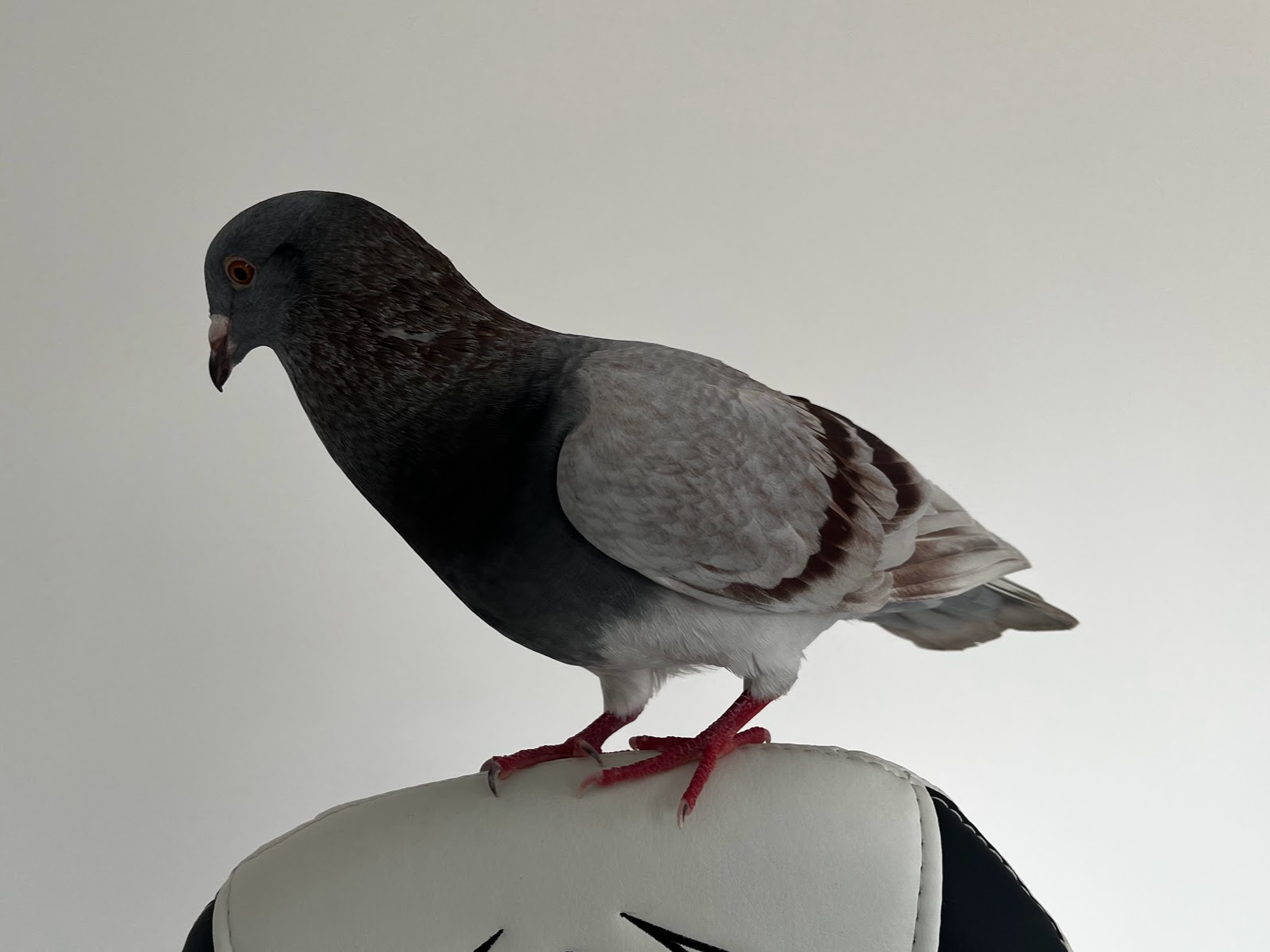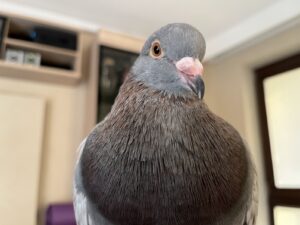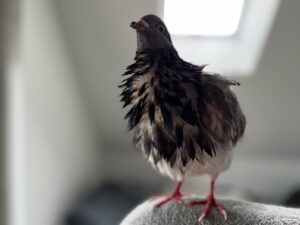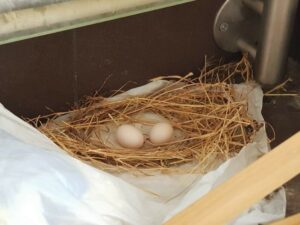As the proud owner of a rescued pet pigeon named Gerard, I know firsthand how rewarding it can be to give a second chance to a feathered friend in need.
But caring for a pet pigeon is not always easy, and it’s important to do your research and be prepared for the unique challenges and responsibilities that come with owning one of these intelligent and social birds.
In this article, I’ll be sharing my own experiences and insights on how to properly care for a pet pigeon like Gerard, including the essentials of housing, diet, health and hygiene, exercise and enrichment, and handling and training.
Whether you’re considering adopting a pet pigeon or are already the proud parent of one, I hope this information will be helpful and informative.
JUMP TO:
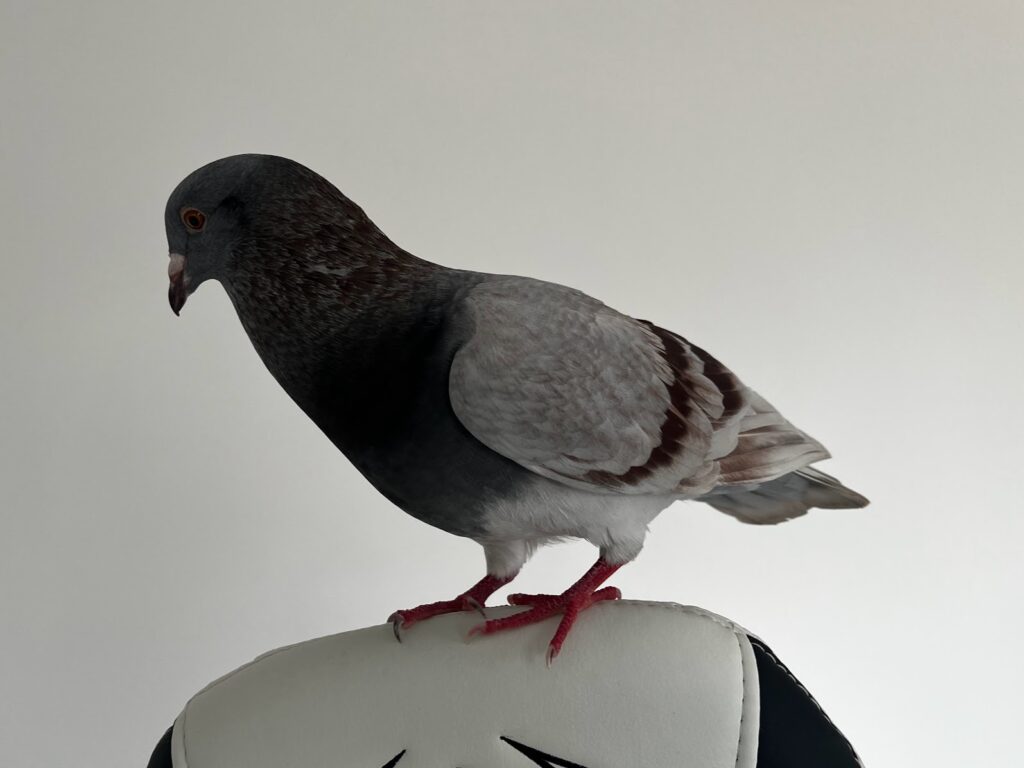
If you are considering a pet pigeon, read this: Are Pigeons Good Pets?
How to take care of a pet pigeon step by step
Housing for your pigeon
Proper housing is essential for the well-being of your pet pigeon.
A spacious and well-ventilated cage is a good starting point, with a minimum size of three to four times the size of the pigeon’s wingspan. It’s also important to provide plenty of room for the pigeon to move around and stretch its wings.
In addition to the cage, it’s important to provide your pigeon with a place to build a nest.
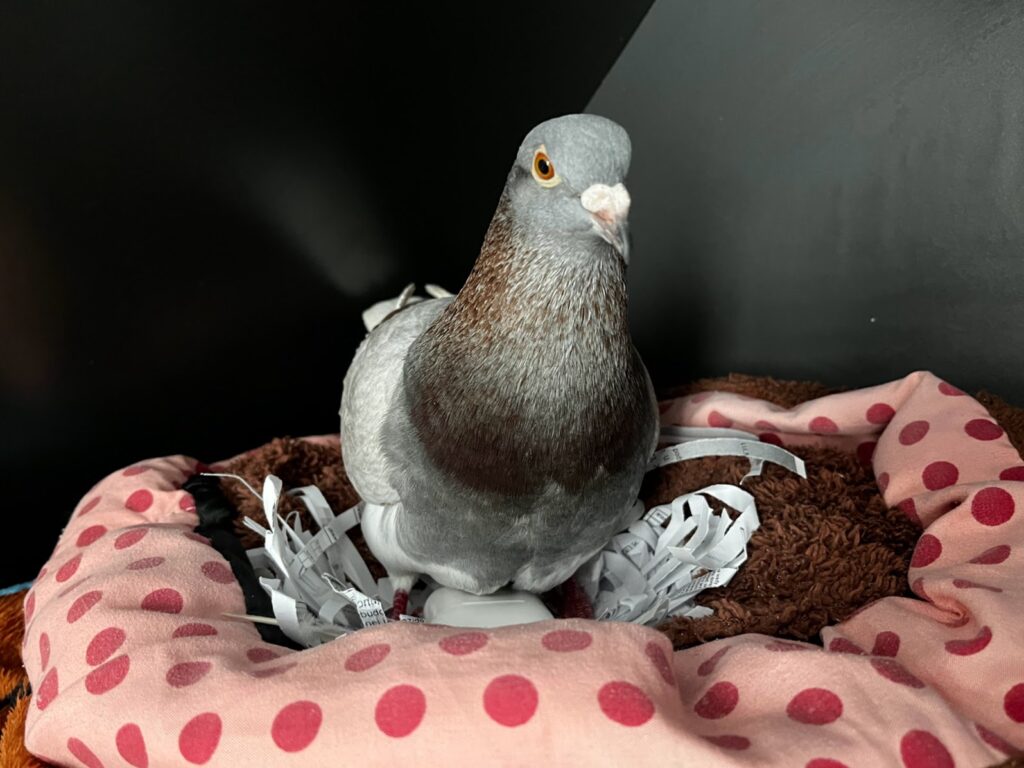
Pigeons are social creatures and often mate for life, and building a nest is an important part of their behavior. A nest box or other enclosed area can provide a safe and secure place for your pigeon to lay eggs and raise chicks, if desired.
It’s also a good idea to provide your pigeon with access to a safe and enclosed outdoor area where it can fly and walk around.
This can help to provide exercise and enrichment for your pigeon, and can help to prevent boredom and keep it healthy and happy.
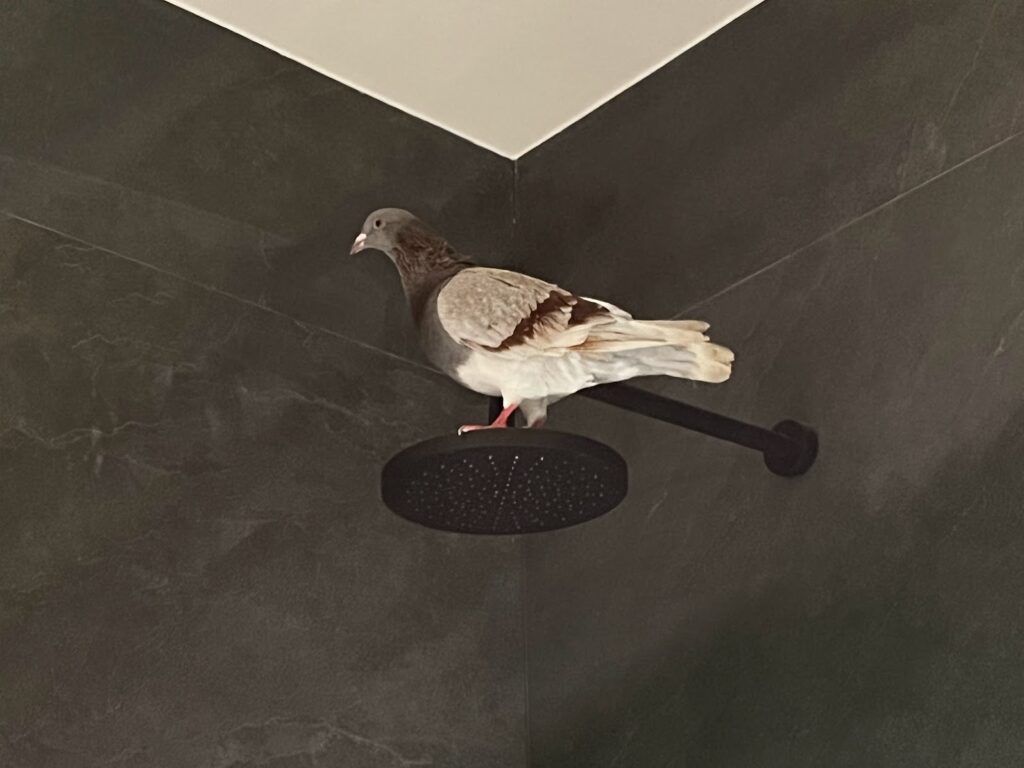
By providing a comfortable and stimulating housing environment for your pet pigeon, you can help to ensure its overall well-being and happiness.
Your pigeon’s diet
As a pet pigeon owner, I understand the importance of providing a healthy and balanced diet for my feathered friend.
Pigeons have specific nutritional needs, and it’s important to understand what these are in order to properly care for your pigeon.
- One of the staples of a pigeon’s diet is a mixture of seeds and grains, such as wheat, oats, and millet. It’s also important to offer a variety of vegetables, as these provide important nutrients and vitamins. Some good options include leafy greens, bell peppers, and carrots.
- It’s also a good idea to supplement your pigeon’s diet with vitamins and minerals as needed. This can be done through the use of a pigeon-specific vitamin and mineral supplement, or through the inclusion of natural sources such as boiled eggs or crushed eggshells.
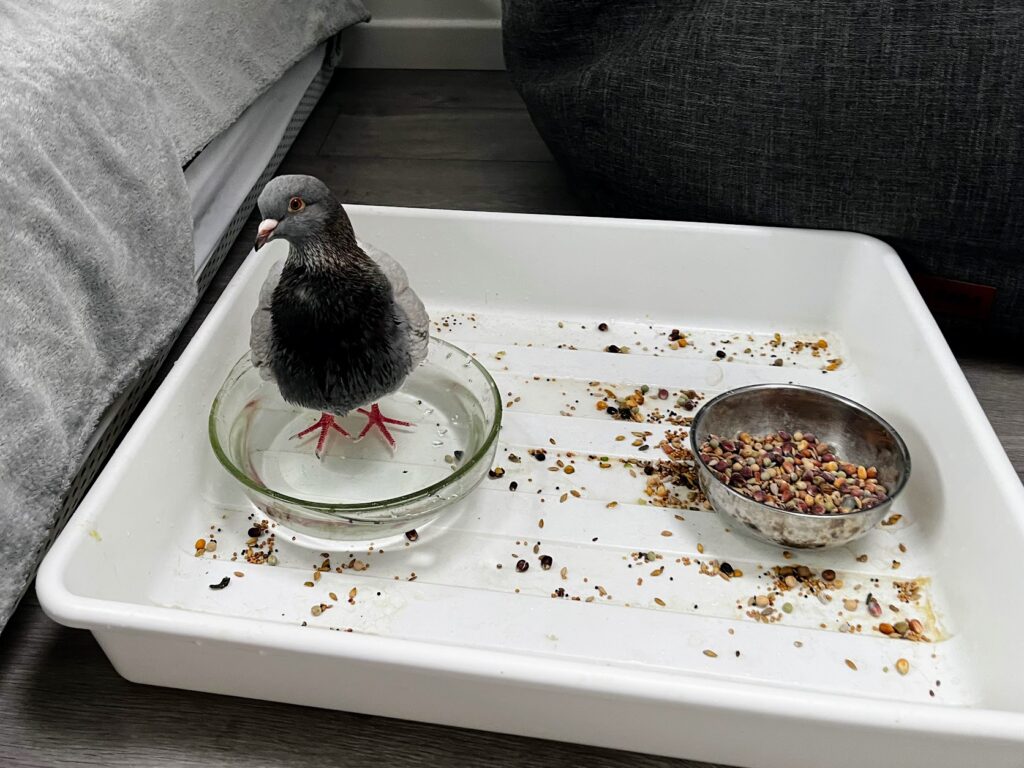
It’s important to remember to provide fresh water and food daily and to clean and refill water and food dishes as needed.
It’s also a good idea to observe your pigeon’s eating habits and look out for any changes, as this can be an early sign of illness.
By providing a healthy and balanced diet for your pet pigeon, you can help ensure its overall well-being and longevity.
Read this: What Do Pigeons Eat?
Your pet pigeon’s health and hygiene
Proper health and hygiene are essential for the well-being of your pet pigeon. Some key considerations include:
- Regularly cleaning the cage and providing fresh water and food daily
- Monitoring for signs of illness and seeking veterinary care as needed
- Implementing a parasite control program
Cleaning the cage on a regular basis is important for maintaining a healthy and hygienic environment for your pigeon. This includes removing any waste or debris, and disinfecting the cage as needed. It’s also important to provide fresh water and food daily, and to clean and refill water and food dishes as needed.
Read this article: How Often Do Pigeons Poop?
Monitoring for signs of illness is also crucial for the health of your pet pigeon. Some common signs of illness in pigeons include a change in appetite, a decrease in energy levels, and respiratory problems. If you notice any of these signs, it’s important to seek veterinary care as soon as possible.
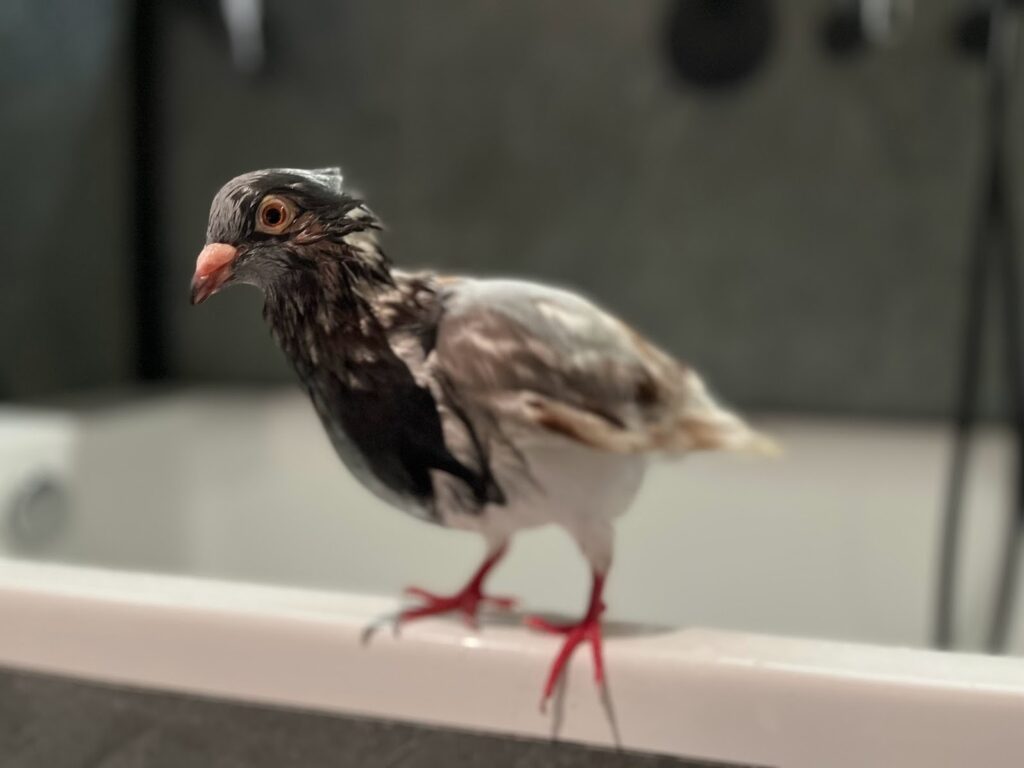
Implementing a parasite control program is another important aspect of pigeon health and hygiene. This can involve regular cleaning and disinfecting, as well as preventive measures such as using a mite and lice spray on a regular basis.
By prioritizing health and hygiene, you can help ensure the well-being of your pet pigeon.
Read this: How To Clean Pigeon Poop
Your pigeon’s exercise and enrichment
Exercise and enrichment are important for the overall health and well-being of your pet pigeon. Some ways to provide these for your feathered friend include:
- Allowing for daily exercise and flight time outside of the cage
- Providing toys and other forms of mental stimulation in the cage
- Creating a comfortable and stimulating environment for the pigeon
Allowing your pet pigeon to have daily exercise and flight time is important for its physical and mental health. This can be done by allowing the pigeon to fly or walk around in a safe, enclosed area outside of its cage.
Providing toys and other forms of mental stimulation is also important for keeping your pigeon entertained and engaged. This can include a variety of objects such as mirrors, ropes, and wood blocks.
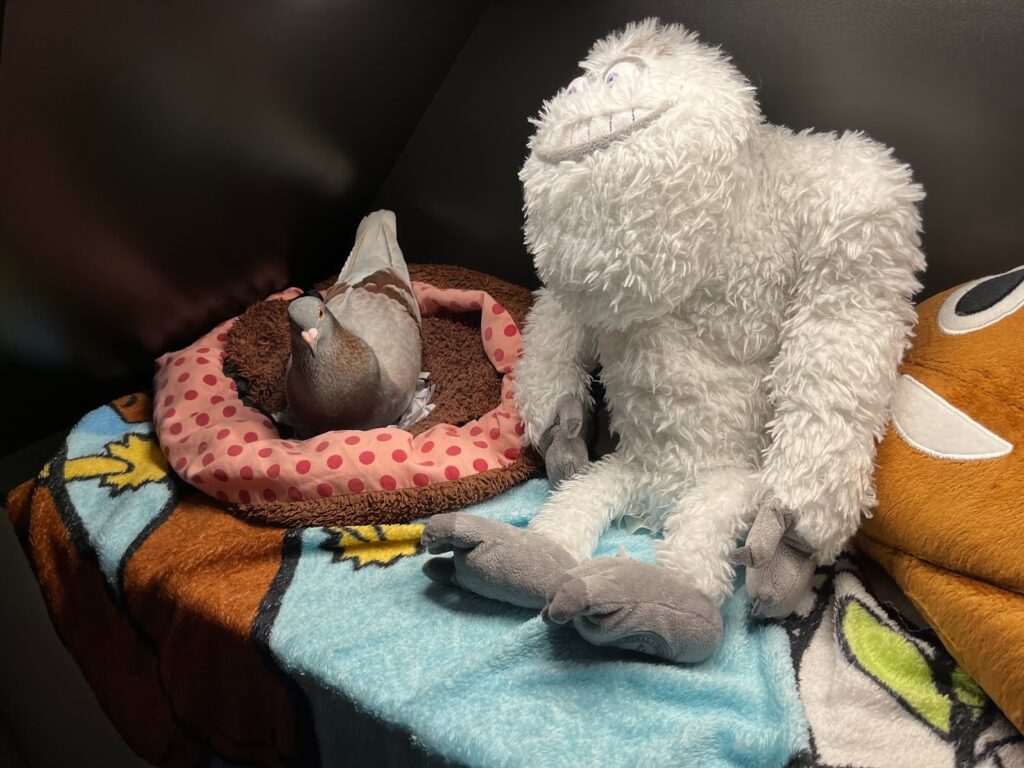
In addition to exercise and mental stimulation, it’s important to create a comfortable and stimulating environment for your pigeon.
This can include providing perches, swings, and other objects for the pigeon to interact with, as well as maintaining a clean and comfortable temperature in the cage.
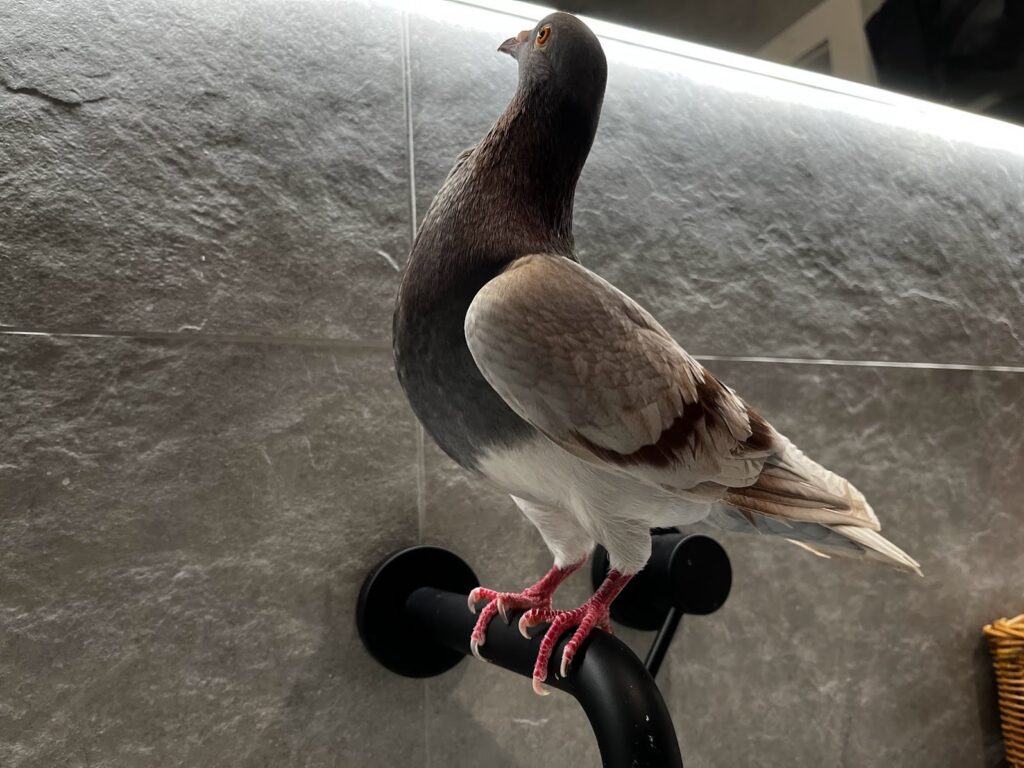
By providing exercise, enrichment, and a stimulating environment for your pet pigeon, you can help ensure its overall well-being.
Read this: 30 Facts About Pigeons and 11 Myths About Pigeons
Your pigeon’s handling and training
Proper handling and training are important for building trust and creating a positive relationship with your pet pigeon. Some tips for handling and training your pigeon include:
- Gently handling the pigeon and building trust
- Teaching basic commands and behaviors through positive reinforcement training
Gently handling your pigeon and building trust is important for creating a positive relationship with your feathered friend. This can be done through regular interaction and handling, as well as providing treats and other forms of positive reinforcement.
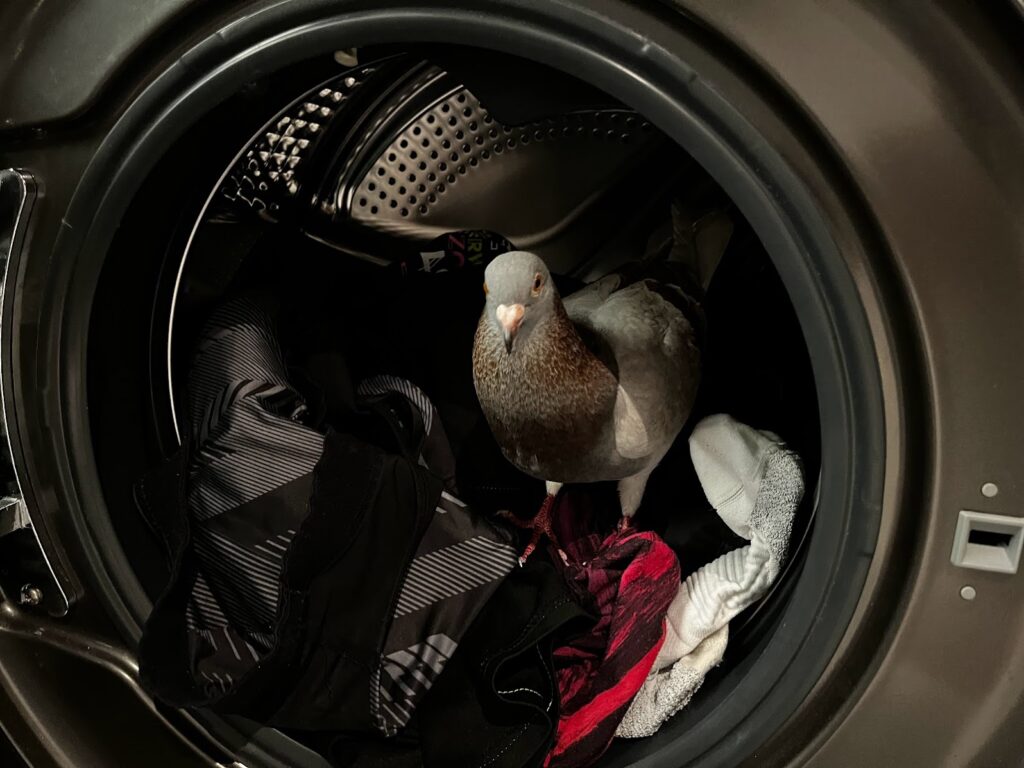
- Training your pigeon to respond to basic commands and behaviors can also be a fun and rewarding experience.
- This can be done through positive reinforcement training, using treats and other rewards to encourage the pigeon to learn new behaviors.
- Some basic behaviors that you can teach your pigeon include coming when called, standing on a perch, and flying to a specific location.
By handling and training your pet pigeon with patience and kindness, you can build a strong bond and create a positive relationship.
How to get a pigeon to trust you
Building trust with your pet pigeon is an important aspect of creating a positive and rewarding relationship with your feathered friend.
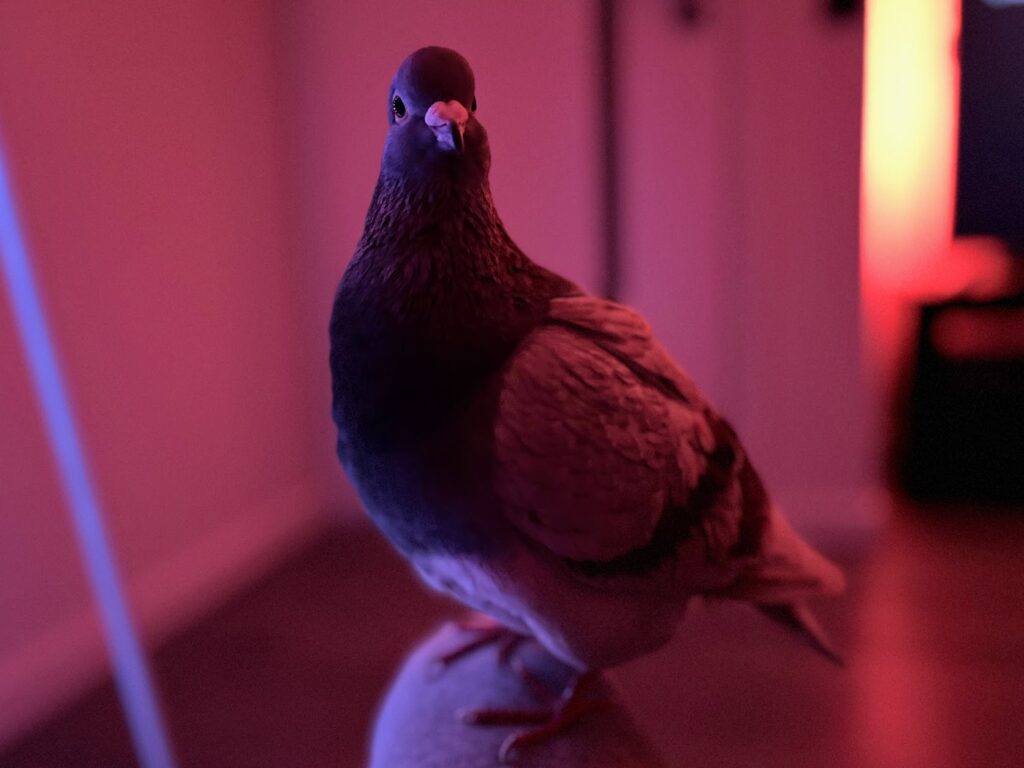
Here are some tips for getting a pigeon to trust you:
- Handle the pigeon gently and consistently: Pigeons are sensitive creatures and can be easily frightened or stressed by rough or sudden movements. By handling the pigeon gently and consistently, you can help it to feel more comfortable and secure in your presence.
- Spend time with the pigeon regularly: Regular interaction and socialization is key to building trust with your pigeon. Set aside time each day to spend with your pigeon, whether it’s playing with toys, providing treats, or simply sitting and talking to it.
- Provide positive reinforcement: Pigeons are intelligent and can be trained to respond to basic commands and behaviors through positive reinforcement. Use treats and other rewards to encourage the pigeon to learn and respond to new behaviors, and be sure to praise the pigeon when it responds correctly.
- Respect the pigeon’s boundaries: All animals, including pigeons, have their own boundaries and limits. It’s important to respect your pigeon’s boundaries and allow it to set the pace of your interactions. If the pigeon seems uncomfortable or unwilling to interact with you, respect its wishes and give it some space.
By following these tips and being patient and consistent, you can help your pet pigeon to build trust and feel more comfortable in your presence.
Frequently Asked Questions About Taking Care Of A Pigeon
What is the best type of cage for a pet pigeon?
The best type of cage for a pet pigeon is one that is spacious and provides plenty of room for the pigeon to move around and stretch its wings. A cage with at least three to four times the size of the pigeon’s wingspan is a good starting point. It’s also important to provide proper ventilation and lighting in the cage.
What do pet pigeons eat?
Pet pigeons require a balanced diet that includes a mixture of seeds and grains, such as wheat, oats, and millet. It’s also important to offer a variety of vegetables, as these provide important nutrients and vitamins. Some good options include leafy greens, bell peppers, and carrots. It’s also a good idea to supplement your pigeon’s diet with vitamins and minerals as needed.
How do I clean my pet pigeon’s cage?
To clean your pet pigeon’s cage, start by removing any waste or debris. Next, use a disinfectant or a mixture of water and vinegar to clean the cage and all of its accessories. Be sure to thoroughly rinse the cage and accessories to remove any cleaning solution. It’s also important to clean and refill water and food dishes as needed.
How do I know if my pet pigeon is sick?
Some common signs of illness in pet pigeons include a change in appetite, a decrease in energy levels, and respiratory problems. If you notice any of these signs, it’s important to seek veterinary care as soon as possible. It’s also a good idea to regularly monitor your pigeon’s health and look out for any changes in behavior or appearance.
How do I train my pet pigeon to do tricks?
Training your pet pigeon to do tricks can be a fun and rewarding experience. The key is to use positive reinforcement training, using treats and other rewards to encourage the pigeon to learn new behaviors. Some basic behaviors that you can teach your pigeon include coming when called, standing on a perch, and flying to a specific location. It’s important to be patient and consistent, and to start with simple commands and gradually build up to more complex tricks.
How much space do pet pigeons need?
Pet pigeons need a spacious and comfortable environment in which to live. A cage with at least three to four times the size of the pigeon’s wingspan is a good starting point. It’s also important to provide plenty of room for the pigeon to move around and stretch its wings. Pigeons also benefit from daily exercise and flight time outside of their cage, so it’s a good idea to provide a safe and enclosed area for them to fly or walk around in.
How do I socialize a pet pigeon?
Socializing a pet pigeon involves gradually introducing the pigeon to new people, environments, and experiences. This can be done through regular handling, training, and exposure to a variety of stimuli. It’s important to be patient and go at the pigeon’s own pace, and to provide plenty of positive reinforcement and rewards to encourage the pigeon to learn and adapt to new situations.
How do I prevent my pet pigeon from getting sick?
There are several steps you can take to help prevent your pet pigeon from getting sick. These include providing a healthy and balanced diet, maintaining good hygiene, and regularly cleaning the cage and accessories. It’s also important to monitor your pigeon for any signs of illness and seek veterinary care as needed. Implementing a parasite control program and providing access to clean, fresh water can also help to keep your pigeon healthy.
How do I bond with my pet pigeon?
Bonding with your pet pigeon involves building trust and creating a positive relationship through regular interaction and handling, as well as providing treats and other forms of positive reinforcement. Training your pigeon to respond to basic commands and behaviors can also be a fun and rewarding way to bond with your feathered friend. It’s important to be patient and go at the pigeon’s own pace, and to always handle the pigeon gently
Final thoughts on pigeon care
In conclusion, taking care of a pet pigeon can be a rewarding and enjoyable experience.
As the owner of a rescued pigeon named Gerard, I can attest to the pure pleasure that comes from providing a happy and healthy home for my feathered friend.
While there are certain responsibilities involved in caring for a pigeon, it is relatively easy to meet the needs of these intelligent and social birds with a little knowledge and effort. With the right care and attention, your pet pigeon can be a loyal and loving companion for many years to come.

